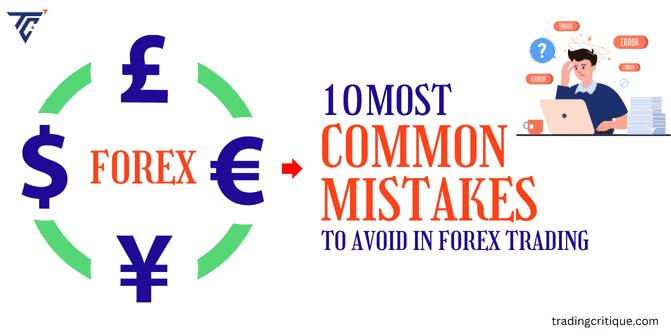Forex trading is the riskiest among all the other financial markets, provided its nature of high volatility and requirement of extraordinary knowledge. Forex, being the largest currency market in the world, provides an enormous opportunity for potential trading for investors.
It is obviously, very common in the forex market to have significant losses due to several mistakes traders commit. In this article, let us discuss in detail, the most common forex trading mistakes, traders generally make.
Quick Insights
10 Common mistakes to avoid
In a huge and volatile market like forex, losing money is as simple as gaining and is very common as well. Below are a few of the very common mistakes forex traders generally make.
#1. Choosing the wrong broker
When a forex trader chooses the wrong broker and deposits his money in the trading account, he loses all his capital due to poor money management and outright trading scams. Brokers try to attract traders by offering low commissions, facilitating sophisticated trading platforms, etc.
Not using reliable sources and not verifying blog posts/reviews before choosing brokers are also reasons for getting trapped in broker scams. Traders, most of the time, don’t start with demo trades and straightway deposit money and start with real-time trading and end up losing all so quickly.
#2. Not doing homework
Forex markets are the largest and highly volatile in the world and hence the chances of coming out of a trade with profits are less. Moreover, there are numerous factors that influence the currency pair price movements such as interest rates, economic data releases, US job reports, etc.
Having said that, one needs to have enough preparation before buying and selling in the forex market.
Doing your homework includes:
- Being aware of the upcoming events
- Possible direction the event may drive the market
- Choosing the right technical indicators to analyze the market data
- Keeping review of the current positions
- Looking for opportunities for add-on trades
#3. Lack of planning
Most of the traders enter into the market without having a proper plan. A trading plan includes:
- Choosing the right currency pair to trade
- Determining the prevailing trend of the chosen currency pair
- Enter and exit points according to the trading goal
- Stop-loss point when market changes the direction
- Hedging activities if required
- Analyzing the market in both fundamental and technical aspects
Rather than planning for a forex trade that suits their financial goals, traders simply prefer to follow the brokers’ tips and end up with losses. Another important point to remember in forex is, that traders don’t mind the currency pairs are traded 24×5, and not all the time is favorable for them.
#4. Trading with emotion
Traders are largely driven by greed as they see the forex market as the simplest way to get rich in a very short period of time without actually considering the risk factors that influence the currency pair prices. Significant losses can cause emotions to run high. Traders don’t keep stress and fear in check throughout the 24×5 forex trading hours.
Emotion-fueled trades generally lead to heavy losses in a volatile market like forex. Making losses, further makes the traders emotional and irrational and tempts them to make reaction trades that are not in their trading plans.
When a trade goes wrong, traders panic and enter into multiple countertrades to compensate for the previous losses. This further aggravates the losses and leads to loss the capital.
#5. Not using stop-loss
Stop and limit orders help traders exit their positions at predetermined levels when the market moves in opposite directions. Since the forex market cannot be watched all the time, it is quite risky to leave the positions unattended. Fixing stop losses enables traders to execute the orders with limited loss when they are not available.
Traders, having poor exit strategies by not keeping calculative stop-loss orders lose substantial money when the market turns directions.
#6. Risking more
Traders use their hard-earned money to easily test a forex trading plan and sometimes tend to risk more than the eligible capital through the leverage option. Another important error forex traders largely make is overtrading. They take multiple positions at a time and also enter into new trades very frequently.
Making too many trades may lead to poor decision-making and not only that the traders incur more transaction costs and increased risk. There is a general saying in the trading world, “If you keep losing, don’t keep trading” and this well suits forex.
#7. Event trading
Currency pairs tend to make huge spikes or steep falls in the wake of macroeconomic news releases. Traders speculate on the direction of the currency price movement and take huge positions before the news comes out in anticipation of big profits.
When a big news is due out, the market may make a big move in either direction and traders will not have enough time to pick a sustained direction to trade. Immediately after the news release, the spread becomes wider and the traders find it difficult to exit the position due to poor liquidity for the desired price.
Experienced and well-informed traders stick with their trading strategies, no matter what the situation is. Being aware of the huge volatility in news trading, they wait patiently until the market provides an opportunity to enter or exit.
#8. Misunderstanding leverage
Forex traders are generally attracted by the opportunity to trade in margin, which is leverage trading. Leverage allows forex traders to open large positions with a small amount of initial deposit. Compared to other financial markets, forex allows traders to trade with a high degree of leverage.
Traders generally don’t understand the fact that, while leverage can maximize their gains, it can also maximize their losses. Most of the time, it may even lead them to lose more than the capital investment. Forex traders tend to risk more money than they can afford by choosing the leverage option.
#9. Poor risk-reward ratio
Successful forex trading is measured by how many winning trades a trader makes on average. Traders are generally advised to keep the winning ratio above 50% to maintain profit. The risk-reward ratio is calculated on the basis, of how much you win compared to how much you lose.
For example, assume your winning trades totaled to $100 and losing trades totaled to $75. Then your risk-reward ratio is calculated as $100/$75 = 1.3. A risk-reward ratio above 1 indicates the trader is in the profit. It is necessary to consider the cost of trade such as commission before you intend to calculate the risk-reward ratio.
#10. Not reviewing trades
Maintenance of trading journals helps the traders learn from their previous mistakes and avoid repeating them. Keeping a record of past transactions enhances the trader’s understanding of the market movements for a better formulation of strategies in the future.
Forex traders, when not keeping the practice of reviewing trades regularly, barely gain trading knowledge and experience. Learning from mistakes is the best way to acquire knowledge in trading financial instruments.
Conclusion
In forex trading, mistakes are good when they are taken as opportunities to learn what works and what doesn’t work for you. It is essential to remain objective in your decision-making and stick to your strategy despite any change in the currency market conditions.
Accept the fact that it is crucial to understand the forex market dynamics and the only way to tackle this is by deploying both fundamental and technical analysis in the right amount. By using technical charting tools effectively, one can easily succeed in their forex trading.









